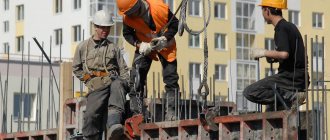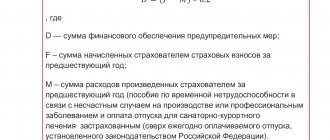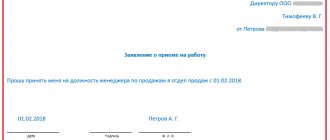Obligation to comply with established labor protection requirements
The main responsibilities of workers to comply with labor protection requirements are enshrined in Art.
214 Labor Code of the Russian Federation. At the same time, in conjunction with this article, many by-laws, intra-industry and intra-company standards are applied. An employee usually becomes familiar with labor protection requirements in the form of approved rules and instructions. However, the procedure for developing these rules and instructions is a rather complex, multi-step process.
| Stage I Federal laws Basic: · Labor Code · “On the sanitary and epidemiological welfare of the population” dated March 30, 1999 No. 52-FZ |
| ▼ |
| Stage II GOST standards GOST “System of standards and occupational safety”. Codes 12.0.001–12.0.006, 12.0.008–12.0.011, 12.0.230, 12.0.230.1–12.0.230.6 |
| ▼ |
| Stage III Regulatory documents of ministries and departments Regulations and recommendations of the Ministry of Labor of the Russian Federation, SanPiNs, SNiPs, standards of departments ensuring technical, fire and sanitary safety |
| ▼ |
| Stage IV Occupational safety service at an enterprise (in an organization) A set of internal regulations and instructions on labor protection and safety, mandatory for employees to follow |
Thus, compliance with labor safety instructions should be considered as compliance with legal requirements.
It is necessary to understand that each provision in the instructions for occupational health and safety is the result of the work of more than one expert in this matter and could not just appear.
If the meaning of any requirement in the instruction is not clear to the employee, he must still strictly follow it and seek additional clarification from a labor protection and safety specialist (there should be one at any enterprise!). This is directly related to the 2nd duty of a labor protection employee under Art. 214 Labor Code of the Russian Federation.
I will develop documents for you
Enter your phone number and I will calculate an estimate for your tasks. Enter without the eight. “Bureau of Ekaterina Vorontsova” – a full range of labor protection services. High quality and on time!
Completion of occupational safety training
All employees of the enterprise, including management, are required to undergo occupational safety training with subsequent knowledge monitoring. There are no exceptions for anyone. Employees of organizations are required to undergo:
- Occupational safety instructions.
- Training in safe work practices.
- Training on the rules of providing first aid to victims.
- Employees working in harmful and dangerous working conditions must undergo internships and exams.
The form and frequency of conduct, as well as the duration of occupational safety training, is established by Resolution 1/29, and in some cases by the employer, based on safety standards for specific types of work. An enterprise can train its employees on its own or attract specialized organizations.
Many people believe that occupational safety training is unnecessary bureaucracy that does nothing but waste working time. And the workers know everything themselves, they have experience.
But very often it is experienced and knowledgeable employees who make mistakes that lead to very sad consequences.
No matter how long you work, do not neglect the requirements of labor protection rules.
For example, an accident in one of the contracting organizations occurred with experienced workers who wanted to finish the job ahead of schedule and go home. The surveyor climbed into the trench for just a few minutes, which was not fully prepared, without completing the necessary documents to carry out the work. He was covered with earth in a few seconds.
Haste and neglect of labor safety very often lead to injuries, and regular and actual briefings and training will force the employee to remember “automatically” about maintaining safety.
Often workers grin and don’t want to hear anything, because they have a lot of work, but workers can be motivated to maintain safe working conditions not only with money, but with simple human conversation. Providing information, perhaps even one-on-one, that an obstacle and failure to comply with labor protection requirements can lead an innocent person, his employer, to places not so remote.
Responsibilities of employees regarding medical examinations
Medical examinations are conducted to determine whether the employee's health allows him to perform his job duties. Medical examinations are divided into:
- preliminary before starting work. After passing a medical examination, the therapist issues a conclusion about the person’s suitability for the job.
- periodic. The medical commission determines whether the employee’s health condition has deteriorated during the performance of his duties. Based on the results of the examination, the medical organization issues a conclusion on admission to further work.
- extraordinary. They are carried out in case of a sudden deterioration in the health of one or a group of workers. May be initiated by the employer.
As part of the performance of labor protection duties, an employee does not have the right to refuse to undergo medical examinations.
An employee may avoid undergoing medical training, knowing about his health problems, but such a desire to keep his job can lead to sadder situations not only for him personally, but also for those around him. For example, an employee with a serious heart condition cannot work as a car driver. And if such diseases are detected, the employer is obliged to remove the employee from work.
Use and careful handling of PPE (working clothing)
Statistics confirm that one out of 8 people who received a work injury or occupational disease did not use or incorrectly used protective equipment.
But working in the required protective clothing and personal protective equipment is also the responsibility of each employee.
Workers must not only know what protection they are entitled to, but also apply them in practice. Rules for the use of individual and collective PPE are included in the instruction and training program on labor protection.
And workers shouldn’t be talking about how wearing a helmet won’t save me. It is necessary, that is, it is necessary. For compliance with labor safety rules, the employee receives a salary in the same way as for performing his other work, which is specified in the employment contract.
But everything should be in moderation, and workers should know when, how and with what PPE they can work. Even if the leader says “do it,” and you see that it is unsafe, you should not agree. After all, life is more valuable!
And the employer must know that the employee has the right to a reasonable refusal to perform unsafe duties. Yes, of course, the manager can indicate “the way out” if the person refuses, but in this case the director or foreman must not forget that if something happens to his subordinate, then he will “sit.”
Responsibility of workers for violation of labor protection requirements
Typically, violations of occupational safety rules are detected either by an employee of the labor protection department or by the immediate supervisor of the violator. It is important to record the violation in writing. This may be a note in the workplace inspection log or an order from the occupational safety department.
It is worth considering that no more than 30 days should pass from the discovery of the offense, with the exception of sick leave and vacation of the employee (Article 193 of the Labor Code of the Russian Federation). The countdown begins from the day when the immediate supervisor of the offender learned about the violation. And no more than six months should pass from the moment the offense itself was committed.
First of all, the manager must request a written explanation from the employee, which he must provide within two working days (Article 193 of the Labor Code of the Russian Federation). If after this time there is no explanatory note, this must be recorded in an act of refusal with the signatures of two witnesses. For example, the act is drawn up by a line manager, and signed by an occupational safety specialist and a personnel officer. An explanatory absence does not deprive the employer of the right to impose a penalty.
Whether to take into account the offender’s arguments or not is decided by the head of the organization, who assesses the severity of the offense and its consequences (real and possible). The manager also decides whether to punish or not.
The decision on disciplinary action is formalized by order of the enterprise. There is no single form of order, but there are general rules. It is necessary to list all the documents that were used to make the decision:
- explanatory;
- reports;
- prescriptions;
- acts of refusal, etc.
It is also necessary to refer to the clauses of the regulatory documents that the employee violated. Management is obliged to familiarize the employee with it within three days after issuing the order against signature.
What types of liability can be applied to an employee?
For failure to comply with their obligations in the field of labor protection, the following types of liability are applied to the employee:
- disciplinary;
- material;
- criminal
There are three types of disciplinary liability: reprimand, reprimand and dismissal (Article 192 of the Labor Code of the Russian Federation). The employer does not have the right to apply another disciplinary sanction, as this will be regarded as a violation of the employee’s rights.
Financial liability obliges the employee to compensate for the damage caused. Even if the employment contract is terminated, this does not relieve the violator from financial liability.
Criminal liability arises if, through the fault of the violator, serious damage to health or injury to another employee was caused.
Duty to know and apply protective equipment
According to statistics, every 8th person injured at work in the Russian Federation did not use or used personal protective equipment incorrectly. These funds are intended to eliminate or significantly reduce the impact of negative production factors on workers. They are:
- individual - for one employee: overalls and shoes, safety glasses, face shields, hard hats, helmets;
- collective - to create and maintain a normal safe environment in the workplace: ventilation and air purification systems, automatic control and decontamination, protection from radiation, vibration and noise.
The employee is obliged to know and apply all the protective equipment required for his type of professional activity. The procedure for handling individual and collective protective equipment is included in the general production instruction or occupational health and safety training. In addition, if practice requires it, the rules for providing first aid to a victim when protective equipment is not used can be studied as part of this instruction.
Grounds for termination of an employment contract
The Labor Code of the Russian Federation contains only two grounds on which it is possible to dismiss an employee who violates labor safety requirements:
1) for repeated failure to fulfill job duties without good reason, if the employee already has a disciplinary sanction (clause 5, part 1, article 81 of the Labor Code of the Russian Federation);
2) in connection with the establishment by the labor protection commission (or the labor protection commissioner) of a violation of labor protection requirements, if this violation entailed grave consequences (industrial accident, accident, catastrophe) or knowingly created a real threat of such consequences (subclause "d" clause 6, part 1, article 81 of the Labor Code of the Russian Federation).
Both cases of termination of an employment contract are dismissal at the initiative of the employer and are applied as a disciplinary sanction. The differences between them are presented in the table.
Differences in the grounds on which you can dismiss an employee who violates labor safety requirements
Obligation to undergo medical examinations
The purpose of medical examinations is to determine whether the employee can perform his or her job in the physiological state in which he or she is at the time of the examination.
Inspections are divided into:
- preliminary when applying for a job. At the same time, it is determined whether the employee’s health is suitable for this job at all.
- periodic during operation. During such examinations, they find out whether the employee is still able to perform his duties (for example, work as a pilot), and whether he is able to begin them at the current moment (to go on a planned flight).
- targeted, usually in emergency situations. For example, if an employee or group of employees suddenly feels unwell.
In order to fulfill the duties of a labor protection employee, each of them must undergo all medical examinations and examinations assigned to him.
Main conclusions
Everyone should know the responsibilities of an employee in the field of labor protection, because any person, going to work, must understand that his main task is to come to work and return home safe and sound.
The greatest value is human life. Neither salary, nor productivity, nor the implementation of a plan can be a reason to put your health and the health of others at risk.
Moreover, statistical data show that in enterprises with properly organized work on occupational safety, production efficiency is much higher than that of less responsible competitors.
And it's easy to explain. Employee discipline minimizes the risks of injuries, equipment breakdowns and emergency situations. The result is increased labor productivity. Moreover, a conscientious employer does not limit itself only to ensuring safe working conditions, but works to prevent occupational diseases, create conditions for proper rest for its workers, organize meals and drinking conditions at the enterprise, etc.
Properly organized occupational safety work and encouraging compliance with occupational safety give employees a feeling of stability and security. Ultimately, staff turnover is reduced, which also affects the stable operation of the entire enterprise.
I’ll end this note, if you have any questions or have anything to add, please join us in the comments!
I wish you safe and efficient work!
Ensuring that employees fulfill labor protection obligations
- Employer's responsibilities.
In accordance with Art. 189 of the Labor Code of the Russian Federation, the employer is obliged to create conditions for the employee to comply with labor discipline. The responsibilities of an employee regarding labor protection are also disciplinary.
Based on this, the employer must:
- equip workplaces and establish labor regulations so that workers can comply with all requirements and regulations for labor protection and safety;
Find out more about the employer’s obligation to assess working conditions in the article “How a special assessment of working conditions is carried out (nuances).”
- provide all workers who need it with personal and collective protective equipment;
- ensure the organization of training, instruction, and testing of workers’ knowledge in the field of labor protection;
- ensure the organization of medical examinations in all necessary cases;
- remove the employee(s) from work if facts of non-compliance with labor protection and safety requirements are revealed (according to the norms of Article 76 of the Labor Code of the Russian Federation).
What documents the employer draws up on labor protection and what is the procedure for storing them, read the article “What are the storage periods for documents on labor protection.”
- Employer rights:
- apply disciplinary sanctions to employees up to and including dismissal (according to the Labor Code of the Russian Federation) for failure to comply with labor protection and safety rules;
You can find out about violations of labor protection requirements in the ConsultantPlus guide to personnel issues. Sign up for a free trial access to K+ and read the material.
- apply incentives for compliance with all rules and regulations.
- State control.
Authorized state bodies are obliged to take measures to ensure compliance with labor protection and safety standards:
- develop industry-specific and generally applicable instructions and standards and bring them to the attention of participants in the labor process;
- carry out periodic and targeted inspections of compliance with labor protection rules and occupational safety at enterprises and organizations;
- carry out the necessary training and certification of workers in cases where such training or certification is not carried out at the enterprise itself;
- apply administrative (and sometimes criminal) sanctions to employees and employers for failure to comply with labor protection requirements.
IMPORTANT! Any accident at work is subject to investigation. The regulation on the specifics of investigating accidents in certain industries was approved by Resolution of the Ministry of Labor of the Russian Federation dated October 24, 2002 No. 73. Cases of occupational diseases are also subject to investigation. The regulation on the investigation and recording of occupational diseases was approved by Decree of the Government of the Russian Federation of December 15, 2000 No. 967.
Standards for issuing PPE
A new version of Article 221 of the Labor Code of the Russian Federation appears in the Labor Code of the Russian Federation. A list of products that belong to PPE has been added to it:
- special clothing and special shoes,
- dermatological protection products,
- protective equipment for respiratory organs, hands, head, face, hearing, eyes,
- fall protection equipment,
- other personal protective equipment
The list is open; the organization has the right to supplement it with the necessary PPE, taking into account its specifics. The Ministry of Labor must approve uniform standard standards for the issuance of personal protective equipment and flushing agents.
Previously on the topic:
Can traveling workers store PPE at home?
Time frame for accident investigations
If an accident occurs, the employer is obliged:
- immediately organize first aid for the victim;
- take urgent measures to prevent the development of an emergency or other emergency situation;
- Before starting the investigation, preserve the situation as it was at the time of the incident, if this does not threaten life and health and does not lead to a disaster, and if this is not possible, draw up diagrams, take photographs or videotape, etc.
- inform regulatory authorities and relatives of the victim about the accident;
- investigate the accident and draw up investigation materials.
The investigation of an accident, as a result of which one or more victims received minor injuries, is carried out by the commission within three calendar days.
The investigation of an accident, as a result of which one or more victims suffered serious health injuries or died, is carried out by the commission within 15 calendar days.
An accident that was not reported to the employer in a timely manner is investigated at the request of the victim within one month.
Another comment on Article 214 of the Labor Code of the Russian Federation
The commented article sets out the main responsibilities of an employee in the field of labor protection, which include: - compliance with labor protection requirements; — correct use of personal and collective protective equipment; — training in safe methods and techniques for performing work and providing first aid to victims at work, instruction on labor protection, on-the-job training, testing knowledge of labor protection requirements; — notifying the manager about any situation that threatens the life and health of people, about every accident that occurs at work, or about a deterioration in one’s health; — passing mandatory medical examinations.
The listed responsibilities of the employee also correspond to his rights enshrined in Article 219 of the Labor Code of the Russian Federation. Failure to fulfill these duties by an employee is a disciplinary offense entailing disciplinary liability.
For example, by an appeal ruling of the Sverdlovsk Regional Court dated November 19, 2014 in case No. 33-15123/2014, the claim for the recovery of wages for forced downtime and compensation for moral damage was rejected. The employee pointed out the illegality of suspension from work without payment of wages due to failure to undergo a medical examination. The court decision rejected the claim, since the employee was given a referral to undergo a periodic medical examination, containing the necessary information about the dates, times, and place of the examination, which allowed him to undergo a medical examination within the prescribed period; issuing an order to suspend him from work was the only option lawful action of the employer.
Additional rights and responsibilities for employees
Basic obligations and rights do not in any way prevent the possible emergence of additional ones. Section 12 of the Labor Code of the Russian Federation declares such powers of both parties.
Certain responsibilities assigned to the employee in addition to the main ones must be recorded in special documents (regulations, instructions, amendments to employment contracts). They must receive permission from both parties, which is confirmed by signatures on the relevant documentation.
The unilateral introduction of additional duties beyond the list of mandatory ones is not allowed.
In the same way, the list of rights can be expanded: additional rights of employees should also be reflected in local regulations. Their acceptance for mutual execution is recorded by the signatures of both parties.






